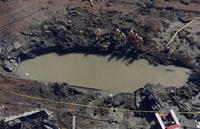-
Michigan could dodge defense cuts

With Congress seeking to make potential cuts in defense spending and contractors bracing for reductions across the country, Michigan’s $385 billion defense industrial base remains optimistic as it could get by unscathed; key lawmakers say the types of services that Michigan’s defense industry provides could keep it from becoming the target of the newly formed Joint Selection Committee on Deficit Reduction
-
-
Taser-related fatalities raise safety concerns

As police across the United States increasingly turn to Taser guns as a non-lethal weapon, the device’s safety has come under scrutiny following several recent deaths involving Tasers; last week the Fayetteville police department in North Carolina recalled all of its Taser M26 units following the death of a fifty-six year old political activist who died after being stunned by police
-
-
NYPD works with suburban police to stop terrorism
In the ten years since 9/11, the New York City police department (NYPD) has worked to forge closer ties with local police departments in an effort to stop terrorist attacks; “The idea is to add rings of security,” explained chief inspector John Hodges of the Westchester County police; “What’s changed since 9/11 is New York City has learned that people who might want to bring something into New York City will have to infiltrate from somewhere outside,” he said
-
-
Groups seek FCC ruling on BART’s cell phone shutdown
An ongoing legal battle in California over whether law enforcement agencies can shut off cell phone service could set the precedent for policies across the United States; in response to the Bay Area Rapid Transit’s (BART) decision to shut down its mobile phone service during a planned protest, several digital rights groups are urging the U.S. Federal Communications Commission (FCC) to take swift action
-
-
Courts uphold rights of citizens to record police in action
The U.S. Court of Appeals for the First Circuit in Boston, in a unanimous decision that many see as a victory for the First Amendment, has recently upheld the right of an attorney to sue police after the police arrested him for using his cell phone to make an audio and video recording of officers conducting an arrest on Boston Common in the fall 2007
-
-
Survey finds U.S. Muslims happy, despite perceived discrimination
A new poll shows that a majority of Muslim-Americans feel singled out by U.S. anti-terrorism policies and many say they have increasingly been the victim of threats and harassment by airport security, law enforcement officers, and others; despite feeling singled out by the government Muslim-Americans are satisfied with life in the United States and have no sense of rising alienation or anger
-
-
WikiLeaks hit by cyberattack
On Tuesday night, the whistle-blower site WikiLeaks suffered from a cyberattack that crashed its homepage; the attack comes shortly after the group released nearly 134,000 additional State Department cables
-
-
Facebook could mean the end of undercover ops
Law enforcement officials have begun using Facebook to identify criminals and gather information about their habits, but the technology has the potential to be a double edged sword; an undercover officer could successfully infiltrate a gang only to have their cover blown after their photo is recognized and their Facebook profile carefully scrutinized
-
-
Report finds poor management cause of San Bruno natural gas explosion

An investigation into the cause of a natural gas pipeline explosion that killed eight people and destroyed dozens of homes in San Bruno, California, placed the blame squarely on fifty-four years of bad management by Pacific Gas & Electric Company (PG&E) and the failure of state and federal regulators to notice the problem
-
-
Judge dismisses parts of lawsuit filed by partially naked man at airport
On Tuesday a federal judge dismissed most of the constitutional claims of a lawsuit filed by a man who was arrested at an airport after he stripped at a security checkpoint in protest of enhanced screening measures
-
-
D.C. continues to struggle with orderly evacuations

Last week’s earthquake that struck less than ninety miles outside of Washington, D.C. exposed the city’s continuing difficulties in effectively evacuating its residents; after the 5.9 magnitude earthquake struck the region, commuters were left stranded for hours as road traffic ground to a halt and trains became overcrowded and delayed due to speed restrictions because of the quake
-
-
Expert warns facial biometrics could compromise privacy
As facial biometric technology becomes increasingly ubiquitous, IT experts warn that these systems can easily be abused and therefore require stringent privacy policies and data encryption
-
-
DHS announces 2011 grants, $800 million less than 2010
Last week DHS announced that it would begin distributing more than $2.1 billion in grant money to state and local agencies for fiscal year 2011, nearly $800 million less than last year; the reduction in grant money comes as a reflection of the U.S. government’s attempts to cut spending and find cost savings
-
-
Texas bills government $349 million for illegal immigrants
Earlier this month in a letter to DHS secretary Janet Napolitano, Texas governor Rick Perry blamed the federal government for failing to secure the border and requested $349 million to help cover the costs of detaining illegal immigrants; when she was governor of Arizona, Napolitano would also regularly send the Department of Justice invoices seeking reimbursements for illegal immigration-related expenses by the state of Arizona
-
-
TSA seeks to reduce workforce to cut costs
In an effort to reduce the size of its workforce the Transportation Security Administration (TSA) is seeking to offer early retirements to its employees
-
More headlines
The long view
Factories First: Winning the Drone War Before It Starts
Wars are won by factories before they are won on the battlefield,Martin C. Feldmann writes, noting that the United States lacks the manufacturing depth for the coming drone age. Rectifying this situation “will take far more than procurement tweaks,” Feldmann writes. “It demands a national-level, wartime-scale industrial mobilization.”
No Nation Is an Island: The Dangers of Modern U.S. Isolationism
The resurgence of isolationist sentiment in American politics is understandable but misguided. While the desire to refocus on domestic renewal is justified, retreating from the world will not bring the security, prosperity, or sovereignty that its proponents promise. On the contrary, it invites instability, diminishes U.S. influence, and erodes the democratic order the U.S. helped forge.
Fragmented by Design: USAID’s Dismantling and the Future of American Foreign Aid
The Trump administration launched an aggressive restructuring of U.S. foreign aid, effectively dismantling the United States Agency for International Development (USAID). The humanitarian and geopolitical fallout of the demise of USAID includes shuttered clinics, destroyed food aid, and China’s growing influence in the global south. This new era of American soft power will determine how, and whether, the U.S. continues to lead in global development.
Water Wars: A Historic Agreement Between Mexico and US Is Ramping Up Border Tension
As climate change drives rising temperatures and changes in rainfall, Mexico and the US are in the middle of a conflict over water, putting an additional strain on their relationship. Partly due to constant droughts, Mexico has struggled to maintain its water deliveries for much of the last 25 years, deliveries to which it is obligated by a 1944 water-sharing agreement between the two countries.
How Disastrous Was the Trump-Putin Meeting?
In Alaska, Trump got played by Putin. Therefore, Steven Pifer writes, the European leaders and Zelensky have to “diplomatically offer suggestions to walk Trump back from a position that he does not appear to understand would be bad for Ukraine, bad for Europe, and bad for American interests. And they have to do so without setting off an explosion that could disrupt U.S.-Ukrainian and U.S.-European relations—all to the delight of Putin and the Kremlin.”
How Male Grievance Fuels Radicalization and Extremist Violence
Social extremism is evolving in reach and form. While traditional racial supremacy ideologies remain, contemporary movements are now often fueled by something more personal and emotionally resonant: male grievance.
